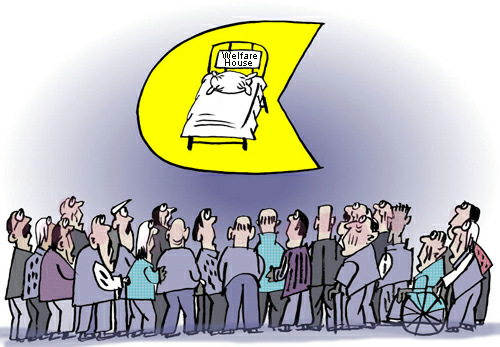
(Ecns.cn) -- Beijing's elderly continue to cope with a severe lack of nursing homes, reports China Economic Weekly.
"Nursing homes in urban areas are either bursting at the seams or terribly expensive," complains Tong, 72, who is unable to look after herself.
"Everybody wants to go to the No. 1 Welfare House, which is public and has good living conditions. It is also cheap and near my home," says the grandmother.
But that facility only has about 1,100 beds, and more than 9,000 people are waiting for them, according to the magazine. Applicants must wait at least 10 years if they sign up now.
"If that's the case, I will have kicked the bucket long before I get admitted," says Tong, who has finally settled in Changping District, a suburb of Beijing. "Many public welfare houses in urban areas refuse to receive old people like me."
Yet private nursing homes in the city are doing little to alleviate the problem.
"For private facilities, if the price is too high, people can't afford it. If the price is too low, the quality of service is suspect and people won't go," explains Guan Xinping, a professor of sociology and demography at Tianjin's Nankai University.
A survey by China Economic Weekly found that a large private nursing home of 3,000 beds in Chaoyang District charges 5,000 yuan for a single room, 3,600 yuan for a double room and up to 3,300 yuan for a triple room.
Those sums have scared many elderly people away, given that the average monthly pension for an urban retiree is only 2,065 yuan. Those living on city outskirts (mainly farmers) are even worse off: they collect a mere 400 yuan.
And although pensions were increased to 2,510 yuan a month on January 1, rents have also gone up.
"With 2,000 yuan in monthly retirement pay I can't afford a good nursing home, where expenses could be 4,000-5,000 yuan per month," Tong says.
Wang Guochen, head of the Beijing Red Cross Society's Yinian Welfare House, agrees it is hard for the elderly in Beijing to cover nursing homes with pension funds.
Moreover, "financial support from the central and local governments is insufficient, so private nursing homes are unable to provide cheap but high-quality services," says Guan Xinping.
Wang Xiaolong, head of the Cuncaochunhui Welfare House in Beijing's Chaoyang District, adds that nearly 90 percent of government funding has gone to public institutions, which are far smaller than private ones in terms of capacity.
Data from the Beijing Municipal Civil Affairs Bureau show that with a 147-million-yuan government subsidy, the Beijing No.1 Welfare House only increased by 500 beds.
With the same amount of money a private nursing home could add 1,470 new beds, says Wang.
Yan Qingchun, deputy director of the China National Committee on Aging, said last March that the "government has helped public nursing homes build houses, buy equipment and hire employees. But private ones have to depend totally on themselves, and they will find it hard to survive in the long run if the situation continues this way."
According to China Daily, the Beijing government has been offering limited subsidies to some private nursing homes, amounting to about 100-200 yuan per resident every month and some money for construction.
The capital has also announced plans to build 100 welfare service centers with 10,000 beds in 2012. The number of beds will be increased to 120,000 by 2015, meeting the needs of four percent of the total elderly population, China Daily cited the Beijing Municipal Civil Affairs Bureau as saying.
Yet by 2015 there will reportedly be 3.2 million people over 60 years old registered in Beijing, some 23 percent of the city's registered household population. Those aged over 80 will increase to 540,000, accounting for four percent of the total.
According to the authority, the capital had 401 nursing homes by the end of 2011 (215 public and 186 private), which means 2.9 beds for every 100 seniors.

Copyright ©1999-2011 Chinanews.com. All rights reserved.
Reproduction in whole or in part without permission is prohibited.